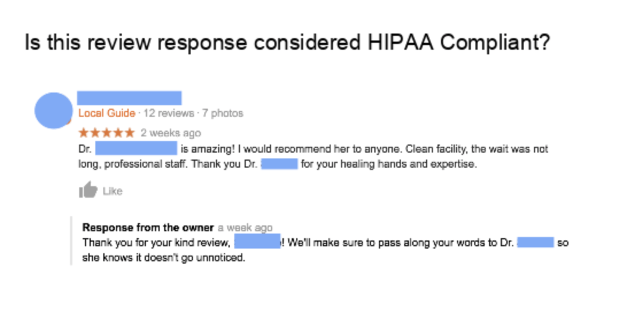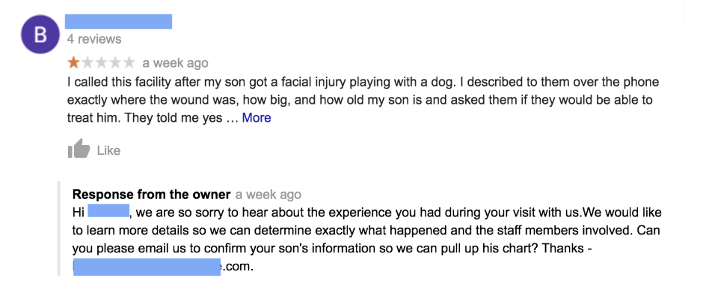Ratings & Reviews
Senior Care Marketing
Home Health Care
Skilled Nursing Facilities
The HIPAA Compliant Way to Respond to Online Reviews

“My migraines are feeling much better thanks to Dr. Jones,” writes a patient in an online review. The doctor replies, “Glad to hear it! Take two more of those pills and call me in the morning!” Seems like a fairly innocuous exchange. That is, until Dr. Jones gets slapped with a HIPAA violation for publicly disclosing too much patient information.
The policies set forth by the Health Insurance Portability and Accountability Act may be difficult to navigate and can discourage many healthcare providers from addressing their online reviews altogether. However, considering a staggering 84% of consumers turn to review sites to find a healthcare provider, online reviews can no longer be ignored. In addition, 89% of consumers read the business’ response to online reviews. Finding a healthcare provider comes down to trust, and how people are treated online is a reflection of that. This not only applies to medical practices but all types of businesses including Senior Living and Skilled Nursing Facilities, Assisted Living, and Home Health Agencies. All signs point to the importance of implementing a strategy for responding to both positive and negative reviews.
Here are some tips to keep in mind when addressing your reviews online, to help build trust with patients while also adhering to HIPAA guidelines.
1. Don’t use any details or specifics about a patient, and avoid language that indicates the patient even visited your local business premises.
In the hypothetical example of Dr. Jones we used earlier, a more appropriate response would have been: “Our office strives to deliver the highest quality patient care. We love to hear about positive experiences. Thanks for sharing this feedback with us!” The response is vague and focuses on the general policies of the organization rather than confirming or elaborating on any details of the patient visit.
Here is another example of what NOT to do:The business owner’s response in the example above includes both the name of the patient and the name of the doctor in the review, and would be in violation of HIPAA. A more appropriate response would be: “Thank you for your kind review! We strive to provide the best possible service.” The response again should focus on the policy of the organization without providing any specific personal information or confirming that the reviewer was even a patient.
2. Don’t argue with negative reviews or provoke further public online discussion.
If a patient were to complain about your staff online, the knee jerk reaction would be to either defend your staff member or to apologize for the staff member’s behavior. However, neither would be compliant because those types of responses would confirm the patient visit and would also open up further public discussion online.
Here is another example of what NOT to do:Rather than admitting the incident happened, keep the response brief, polite, and as general as possible, while moving the conversation offline. An appropriate response would be: “We are committed to providing the best patient care experience. It’s our policy to resolve issues offline. Please feel free to contact us at [enter contact information].”
3. Monitor and respond to online reviews with Reputation Management Tools.
It can be overwhelming to manually track your online business reviews. Time spent on marketing tasks like responding to your reviews can be better spent on quality care for your patients. Reputation Management platforms like Consumer Fusion can help you keep track of incoming reviews with automated review alerts and allows you to set up HIPAA compliant review responses to automatically respond within 24-48 hours of a new review.
While responding to reviews is an important and effective component of your overall online reputation, it’s only the beginning. Reputation Management services like those provided by Consumer Fusion can also be utilized to generate more reviews for your business to build upon that loyalty to your brand. Consumer Fusion also has a proven track record for getting reviews removed that violate terms and conditions from major review sites including Google, Facebook, Caring.com and Healthgrades. As long as you are following best practices for HIPAA compliance, monitoring your online reviews can work wonders in establishing trust and improving relationships with your patients.
***This blog post is related to a webinar Mark Spencer did in Caring's Digital Marketing Academy, focused on HIPAA and online reviews.
Available in the webinar archive as:



You May Also Like This
Ratings & Reviews
Senior Care Marketing
Home Health Care
Skilled Nursing Facilities
The HIPAA Compliant Way to Respond to Online Reviews

“My migraines are feeling much better thanks to Dr. Jones,” writes a patient in an online review. The doctor replies, “Glad to hear it! Take two more of those pills and call me in the morning!” Seems like a fairly innocuous exchange. That is, until Dr. Jones gets slapped with a HIPAA violation for publicly disclosing too much patient information.
The policies set forth by the Health Insurance Portability and Accountability Act may be difficult to navigate and can discourage many healthcare providers from addressing their online reviews altogether. However, considering a staggering 84% of consumers turn to review sites to find a healthcare provider, online reviews can no longer be ignored. In addition, 89% of consumers read the business’ response to online reviews. Finding a healthcare provider comes down to trust, and how people are treated online is a reflection of that. This not only applies to medical practices but all types of businesses including Senior Living and Skilled Nursing Facilities, Assisted Living, and Home Health Agencies. All signs point to the importance of implementing a strategy for responding to both positive and negative reviews.
Here are some tips to keep in mind when addressing your reviews online, to help build trust with patients while also adhering to HIPAA guidelines.
1. Don’t use any details or specifics about a patient, and avoid language that indicates the patient even visited your local business premises.
In the hypothetical example of Dr. Jones we used earlier, a more appropriate response would have been: “Our office strives to deliver the highest quality patient care. We love to hear about positive experiences. Thanks for sharing this feedback with us!” The response is vague and focuses on the general policies of the organization rather than confirming or elaborating on any details of the patient visit.
Here is another example of what NOT to do:The business owner’s response in the example above includes both the name of the patient and the name of the doctor in the review, and would be in violation of HIPAA. A more appropriate response would be: “Thank you for your kind review! We strive to provide the best possible service.” The response again should focus on the policy of the organization without providing any specific personal information or confirming that the reviewer was even a patient.
2. Don’t argue with negative reviews or provoke further public online discussion.
If a patient were to complain about your staff online, the knee jerk reaction would be to either defend your staff member or to apologize for the staff member’s behavior. However, neither would be compliant because those types of responses would confirm the patient visit and would also open up further public discussion online.
Here is another example of what NOT to do:Rather than admitting the incident happened, keep the response brief, polite, and as general as possible, while moving the conversation offline. An appropriate response would be: “We are committed to providing the best patient care experience. It’s our policy to resolve issues offline. Please feel free to contact us at [enter contact information].”
3. Monitor and respond to online reviews with Reputation Management Tools.
It can be overwhelming to manually track your online business reviews. Time spent on marketing tasks like responding to your reviews can be better spent on quality care for your patients. Reputation Management platforms like Consumer Fusion can help you keep track of incoming reviews with automated review alerts and allows you to set up HIPAA compliant review responses to automatically respond within 24-48 hours of a new review.
While responding to reviews is an important and effective component of your overall online reputation, it’s only the beginning. Reputation Management services like those provided by Consumer Fusion can also be utilized to generate more reviews for your business to build upon that loyalty to your brand. Consumer Fusion also has a proven track record for getting reviews removed that violate terms and conditions from major review sites including Google, Facebook, Caring.com and Healthgrades. As long as you are following best practices for HIPAA compliance, monitoring your online reviews can work wonders in establishing trust and improving relationships with your patients.
***This blog post is related to a webinar Mark Spencer did in Caring's Digital Marketing Academy, focused on HIPAA and online reviews.
Available in the webinar archive as:




